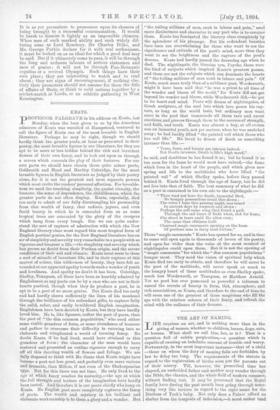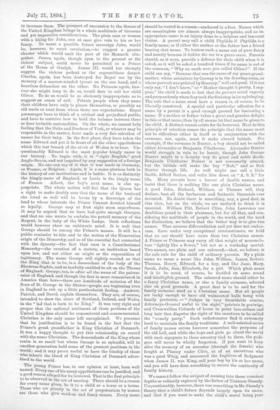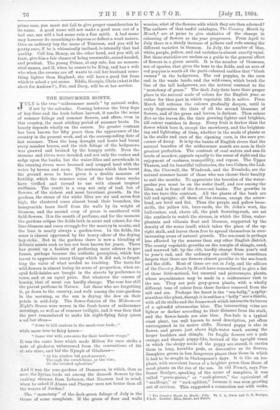THE ART OF NAMING.
TIPE requires an art, and in nothing more than in the giving of names, whether to children, horses, dogs, cats, or houses. What shall we call him, her, or it ? That is a question full of subtle perplexities,—a question. which is capable of causing an indefinite amount of trouble and worry. Fortunately, in the most important instance—that of a child —those on whom the duty of naming falls are forbidden by law to delay too long. The requirements of the statute in regard to the registration of births soon put the parents out of their misery. Till, however, the prescribed time has elapsed, an undecided father and mother may wander through the Bible, the classics, and the whole field of modern romance, without finding rest. It may be presumed that the Royal family have during the past month been going through some- thing very like torture in regard to the right name for the Duchess of York's baby. Not only does a Palace afford no shelter from the tempests of indecision,—it must rather tend to increase them. The prospect of succession to the throne of the United Kingdom brings in a whole multitude of tiresome and yet imperative considerations. The plain man or woman with a liking for John, can at once give rein to his or her fancy. To name a possible future sovereign John, would be, however, to court revolution,—to suggest a greater charter which would omit the part of the Monarch alto- gether. James, again, though open to the poorest or the richest subject, could never be permitted to a Prince of the House of Guelph. James III. would too strongly suggest the vicious pedant or the superstitious despot. Charles, again, has been destroyed for Royal use by the memory of a narrow-minded tyrant on the one hand, and a, heartless debanchee on the other. No Princess again, how- ever she might long to do so, would dare to call her child Oliver. To do so would be so obviously inappropriate as to suggest an omen of evil. Private people when they name their children have only to please themselves, or possibly an old uncle or aunt from whom there are expectations. Royal personages have to think of a critical and prejudiced public, and have to contrive how to hold the balance between three or four irritable nationalities. On the whole, we cannot help feeling that the Duke and Duchess of York, or whoever may be responsible in the matter, have made a very fair selection of names for their baby. In the first place, they have taken the name Edward and put it in front of all the other appellations which this last branch of the stcck of Woden is to bear. Un- questionably Edward is the most popular kingly name in our history. To begin with, it is " right English," good Anglo-Saxon, and not impaired by any suggestion of a foreign origin. No one can say of it that it was made in Germany, or France, or Belgium. Again, it is a name glorious both in the history of our institutions and in battle. It is as distinctly the kingly name of England, as Louis is the kingly name of France. Albert, the boy's next name, is also ap- propriate. The whole nation will feel that the Queen has a right to make doubly sure that the name of the husband she loved so well will be borne by a Sovereign of the land to whose interests the Prince Consort devoted himself so loyally. George may at first sight seem superfluous. It may be argued that we have had quite enough Georges, and that no one wants to embalm the putrid memory of the Regent, in the baby of the White Lodge. Such reflections would however show an unhistoric mind. It is well that George should be among the Prince's names. It will be a public reminder to him and to the nation of the Hanoverian origin of the Monarchy, and so of the essential fact connected with the dynasty—the fact that ours is a Constitutional Monarchy—the creation of a statute, an institution based upon law, and not either on might or the superstition of legitimacy. The name George will rightly remind us that the King that is to be, is a descendant of the body of the Eleotress Sophia, and so lawfully entitled to sit on the Throne of England. George, too, is after all the name of the patron- saint of England, and though the fact is more remembered in America than here—there are hundreds of societies of the Sons of St. George in the States—people are beginning even in England to rub up a little particularist feeling. Andrew, Patrick, and David, explain themselves. They are, of course, intended to show the share of Scotland, Ireland, and Wales, in the "lad that is born to be King." It was very right and proper that the national sentiment of those portions of the United Kingdom should be remembered and commemorated. Christian is the only name left unexplained. We presume that its justification is to be found in the fact that the Prince's great grandfather is King Christian of Denmark. It was a happy thought to put this relationship on record with the name Christian. The descendants of the King whose realm is so small but whose lineage is so splendid, will in another generation hold some of the greatest positions in the world ; and it may prove useful to have the kinship of those who inherit the blood of King Christian of Denmark adver- tised to the world.
The young Prince has, in our opinion at least, been well named. Every one of his many appellations can be justified, and a good reason alleged for its bestowal. That is the first principle to be observed in the art of naming. There should be a reason for every name given, be it to a child or a horse or a house. Those who err grossly in the art of perpetuation by names are those who give random and fancy names. Every name should be rooted in a reason—anchored in a fact. Names which are meaningless are almost always inappropriate, and an in- appropriate name is an injury done to a helpless and innocent victim. A parent may call a child Phyllida if Phyllida is a family name, or if either the mother or the father has a friend bearing that name. To bestow such a name out of pure fancy and merely because it tickles the ear is a grave error. Parents should, as it were, provide a defence for their child when it is asked, as it will be asked a hundred times if its name is out of the common, " Why on earth were you called Chloe ?" If the child can say, " Because that was the name of my great-grand- mother, whose miniature by Conway is in the drawing-room, or whose portrait was painted by Romney," well and good. If it can only say, "I don't know," or " Mother thought it pretty, I sup- pose," the child is made to feel that its parents acted vaguely and purposelessly whenthey took the first step in its upbringing. The rule that a name must have a reason is, of course, to be liberally construed. A special and particular affection for a name by a parent is a good enough ground for bestowing a name. If a mother or father takes a great and genuine delight in this or that name, then by all means let that name be given to the child. A distinct reason exists for its bestowal. Next to this principle of selection comes the principle that the name must not be ridiculous either in itself or in conjunction with the surname, nor, again, must it make absurd initials. For example, if the surname is Bunter, a boy should not be called either Alexander or Benjamin Ullathorne. Alexander Bunter would struggle in vain to be heroic, though John George Bunter might in a homely way do great and noble deeds. Benjamin Ullathorne Bunter is not necessarily absurd, but the initials will make the boy " Bab," and so Bub Bunter through life. As well might one call a little Smith, Alfred Seaton, and write him down an " A. S. S." for life. Many parents have a horror of double names, and insist that there is nothing like one plain Christian name. A good John, Richard, William, or Thomas will, they declare, beat all the barbarous and fantastic binomials ever invented. No doubt there is something, nay, a good deal, in this view, but on the whole, we are inclined to think it is unsound. William Pitt, Robert Clive, John Lawrence are doubtless grand in their plainness, but for all that, and con- sidering the multitude of people in the world, and the need for distinction, we believe that the better way is to give two names. That secures differentiation and yet does not embar- rass. Save under very exceptional circumstances, we hold that no one should have more than two Christian names. A Prince or Princess may carry all that weight of nomencla- ture "lightly like a flower," but not so a workaday mortal. Two names, one plain and one coloured,—that, we believe, is the safe rule for the child of ordinary parents. By a plain name we mean a name like John, William, James, Robert, Thomas, Henry, Edward, for a boy, and like Jane, Mary, Sarah, Julia, Ann, Elizabeth, for a girl. Which plain name it is to be must, of course, be decided on some sound and intelligible ground. The coloured name should either be a fancy Christian name, or else a family surname, selected also on good grounds. A great deal is to be said for the family surname used as a Christian name. Not all people are lucky enough to have old wainscoted halls hung with family portraits, — " Judges in very formidable ermine, Attorneys-General awful to the sight," patriots in periwigs, and Cromwellian Colonels of horse in point lace-collars and long hair that disputes the right of the courtiers to be called the "comely party." Such unfortunates find it extremely hard to maintain the family traditions. A well-selected series of family names serves however somewhat the purposes of the old hall, and while the boys and girls go about the world with such signposts to these ancestry tied to them, the pedi- gree will never be wholly forgotten. If you want to keep alive the memory of an ancestor (through the female) who fought at Plassey under Clive, or of an ancestress who was a good Whig, and succoured the fugitives of Sedgmoor when James II. was King, call your boy by his or her name, and you will have done something to secure the continuity of family history.
We cannot follow the subject of naming into those remotest depths so valiantly explored by the father of Tristram Shandy. Unquestionably, however, there was something in Mr. Shandy's theory that a child's future depends largely upon its name, and that if you want to make the child's moral being your prime care, you must not fail to give proper consideration to its name. A good name will not make a good man out of a bad one, nor will a bad name ruin a fine spirit. A bad name may however do something to depress or deflect a weak nature. Give an ordinary boy the name of Tristram, and you will be pretty sure, if he is whimsically inclined, to intensify that bad quality. Call him Henry, on the other hand, and you will, at least, give him a fair chance of being reasonable, sound-headed, and prudent. The young Prince, at any rate, has no nonsen- sical names, and if, when he comes to be King, and has a wife who when the crowns are off wants to call her husband some- thing lighter than England, she will have a good list from which to select a pet name. Eddie, Georgie, Chris (what is the short for Andrew ? ), Pat, and Davy, will be at her service.



































 Previous page
Previous page